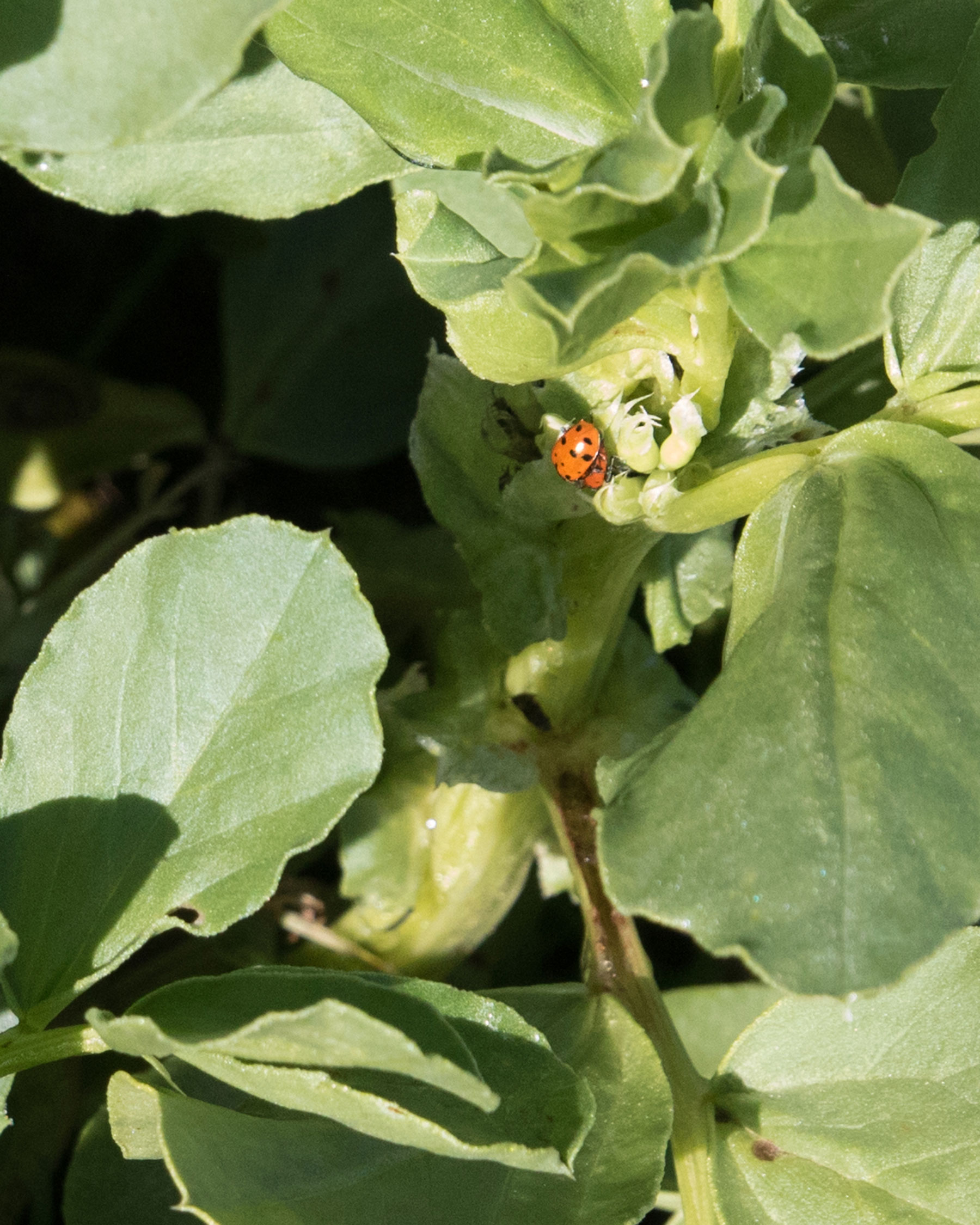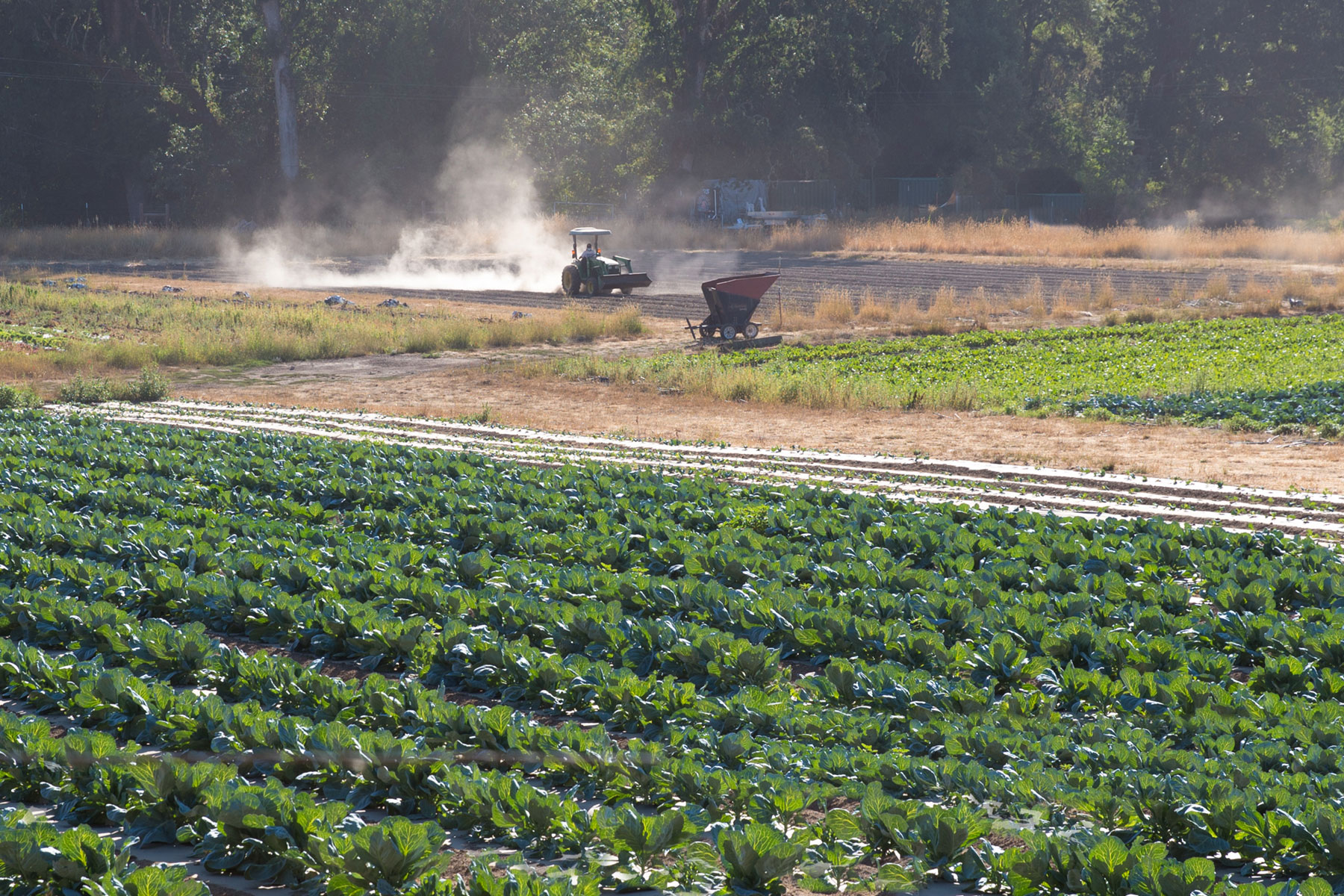Irene’s Garden

Farming with Flower Power in Laytonville
by Ree Slocum
It was a wet spring morning when I met Irene Engber, owner of Irene’s Garden, at her 10-acre, organic certified vegetable farm located at Black Oak Ranch outside of Laytonville. Just prior to our interview, she gave some last minute instructions to her employees. Beka was to work in the greenhouse planting 300 seeds of each basil variety, while Aaron was asked to deal with a pump that needed repairs. Sounded like a typical, busy farming morning.
Irene and I walked around the wet, muddy rows of garden blocks and, with twinkling brown eyes and hints of a delightful Irish brogue, she wove the story of her adventurous life and current worries with recent farming challenges. I asked her how she’d gotten into farming. “Where to start?” she responded. “Well, I was a secretary in Dublin and decided there was more to life than this,” she answered. It was the 1970s, and she had been about twenty-one and eager to travel. She needed money, so she ended up both traveling and earning money as a nanny, first in Greece and later in Toronto, Canada. Irene traveled with the Toronto family as they vacationed in Miami and used that opportunity to stay in the United States. She had vague plans to take a bus across the country to San Francisco and then fly back home to Dublin, but she was robbed on the bus, ended up broke, and met a man who told her about a place she could stay and work to earn enough money to get back to Ireland.
Young, shy Irene got off the bus at Desert Center, California. She was alone in the tiny settlement, walked a short distance through the brush, found the house she was looking for, and landed in the arms of some members of the Hog Farm collective. This branch of the legendary, communal hippie family was tending twenty-six acres of table grapes in the surrounding desert. Although Irene initially felt out of her element, she soon realized she’d found home. She was tutored about grape cultivation by long-bearded Evan, who later became her husband. “By the end of the day I was in love with it all! With the work, and to wake up every morning and know that the sun was gonna shine was huge for me since I grew up in Ireland. Lunch was brought out to us in the field. It was well organized and very friendly.” Irene cancelled her travel plans and continued farming in the desert for the next eight years. She and Evan eventually married and raised their children on the desert vineyard until they all moved to Mendocino County.
Twenty-nine years have passed since Irene first started farming on a half acre at Black Oak Ranch. She produces food for the Hog Farm families and has gradually expanded the farming to ten acres, which includes an acre of fruit trees. Irene and crew now produce up to 10,000 pounds each of onions, cabbage, carrots, cantaloupes, and more for the Mendo Lake Food Hub, various businesses, and local Farmers Markets.
Currently, the veteran farmer is witnessing the climate changing more drastically, which is creating new challenges for her and other farmers. The farmers network and share ideas and solutions with one another beyond the usual rusted nut on the disc or gophers snacking in the carrot patch.
The day before our interview, Irene had found aphids on some of the overwintering fava cover crop, planted in the soil where cabbage and broccoli had been lost to aphids the prior year. The infestation had gone too deeply into the plants, and they had to be destroyed. Irene lost thousands of dollars in the process. As she looked at the favas the day of our meeting, she mused, “Hmmm … the aphids aren’t like they were yesterday. It must be the ladybugs doing their job.” But it was scary to see the destroyers of a huge crop reappear. “I never used to worry about aphids, but last year they were the worst I’ve ever seen. I consulted my advisor, “Amigo Bob.” He suggested I use an organic insecticidal soap and plant flowers everywhere— and every ten feet in the cabbage rows—to attract beneficial insects.” The plan includes planting nasturtiums far away from the brassicas to attract the aphids away from the food crops. She’ll then use the soap to kill them, protecting the beneficial insects in her brassicas. It takes lots of work “ … and monitoring, monitoring, monitoring!” she adds.
In the past few years, Irene has been tested in many ways. Her 2016 over-wintering onion crop rotted in the ground because of unseasonal, early, and persistent rain in October. This was a first for the veteran farmer. Her solution? “For this year’s starts, I bought a bunch of baby swimming pools on sale last fall, punched holes in the bottom, filled them with soil, planted the onion seed, and covered everything with a large plastic hoop house so I could control the temperature. They’re doing great! I’ve never had such huge onion starts,” she exclaimed. Soon the baby onions will be transplanted in rows of richly composted soil and, when ready, about 10,000 pounds will be harvested.
As I walked away from Irene’s Garden, I felt a surge of renewed commitment to support local farmers like Irene. I know so many. They work and play hard and are committed and earnest about sustainably producing healthy food for their Mendocino County communities and beyond.
Irene sells her produce through the Mendo Lake Food Hub. Her produce is also available at Geiger’s in Laytonville, Mariposa Market in Willits, the Ukiah Coop, and Farmers Markets. One of Irene’s steadfast helpers, Ariel Hanson, is now managing flower production. Pick some up at the farm to brighten your summer table. Flowers are food for the soul!
Photos by Ree Slocum, courtesy of Mendo Lake Food Hub.
Ree Slocum is a fine art freelance photographer and writer who loves simple, creatively delicious, locally sourced food and beverages and revels in being distracted by the natural world when working in her deck “office.”


